In its war on terrorism in Yemen, the US government describes Yemen as "an important partner in the global war on terrorism". There have been attacks on civilian targets and tourists, and there was a cargo-plane bomb plot in 2010. Counter-terrorism operations have been conducted by the Yemeni police, the Yemeni military, and the United States Armed Forces.

Mukalla is a seaport and the capital city of Yemen's largest governorate, Hadhramaut. The city is in the southern part of the Arabian Peninsula on the Gulf of Aden, on the shores of the Arabian Sea, about 480 kilometres east of Aden. It is the most important port city in the Hadhramaut region. It is also the sixth-largest city in Yemen, with a population of approximately 595,000 as of 2023. The city is served by the nearby Riyan International Airport.

Al-Qaeda in the Arabian Peninsula, abbreviated as AQAP, also known as Ansar al-Sharia in Yemen, is a Sunni Islamist insurgent extremist group, which is part of the al-Qaeda network and primarily active in Yemen and Saudi Arabia. It is considered the most active of al-Qaeda's branches that emerged after the weakening of central leadership.
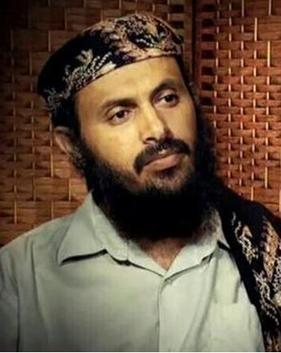
Qasim Yahya Mahdi al-Raymi was a Yemeni militant who was the emir of al-Qaeda in the Arabian Peninsula (AQAP). Al-Raymi was one of 23 men who escaped in the 3 February 2006 prison-break in Yemen, along with other notable al-Qaeda members. Al-Raymi was connected to a July 2007 suicide bombing that killed eight Spanish tourists. In 2009, the Yemeni government accused him of being responsible for the running of an al-Qaeda training camp in Abyan province. After serving as AQAP's military commander, al-Raymi was promoted to leader after the death of Nasir al-Wuhayshi on 12 June 2015.

The Al-Qaeda insurgency in Yemen is an ongoing armed conflict between the Yemeni government, the United States and their allies, and al-Qaeda-affiliated cells in Yemen. It is a part of the Global War on Terror.

The Southern Movement, sometimes known as the Southern Separatist Movement, or South Yemen Movement, or Aden Movement, and colloquially known as al-Hirak, is a political movement and paramilitary organization active in the south of Yemen since 2007, demanding secession from the Republic of Yemen and a return to the former independent state of South Yemen. At present, its best-known political offshoot, the Southern Transitional Council led by Aidarus al-Zoubaidi, is the de facto leadership across many provinces of the south.

United States drone strikes in Yemen started after the September 11, 2001 attacks in the United States, when the US military attacked the Islamist militant presence in Yemen, in particular Al-Qaeda in the Arabian Peninsula using drone warfare.

The First Battle of Mukalla (2015) was a battle between al-Qaeda in the Arabian Peninsula, local tribesmen, and the Yemen Army for control of the coastal city of Mukalla, Yemen.
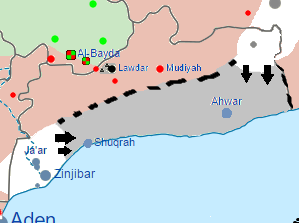
The Southern Abyan Offensive refers to a 2016 offensive that AQAP launched in late February, which ended with a victory for AQAP as Yemeni tribal fighters loyal to president Abdrabbuh Mansur Hadi were driven out of the Abyan Governorate.
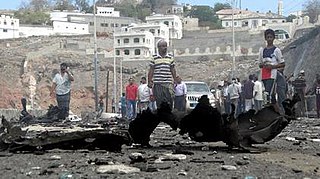
The Aden unrest was a conflict between Islamist factions, such as al-Qaeda in the Arabian Peninsula, and Islamic State of Iraq and the Levant's Yemen Branch, against the loyalists of president Abd Rabbuh Mansur Hadi and later to conflict between UAE-backed and Saudi-backed factions within the coalition. In 2017, fighting also broke out between factions aligned with different members of the Saudi-led coalition namely Saudi Arabia-backed Abdrabbuh Mansur Hadi and Al-Islah and UAE-backed separatist Southern Transitional Council and Southern Movement.
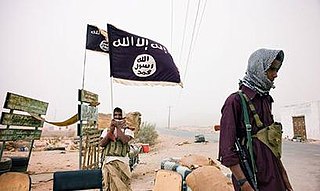
The Shabwah Governorate offensive is an insurgent campaign by Al-Qaeda in the Arabian Peninsula (AQAP) forces to take control of Shabwah Governorate during the Yemeni Civil War.
The Popular committees, also known as the People's Committees, are armed groups formed by Yemeni tribes on behalf of more professional armed forces.
The Second Battle of Mukalla refers to an armed conflict between al-Qaeda in the Arabian Peninsula (AQAP) and the Saudi-led Coalition. The aim of the coalition offensive was to disable the newly resurgent al-Qaeda Emirate in Yemen by recapturing its capital, Mukalla. The battle led to a coalition victory, in which the coalition forces gained control of Mukalla and the surrounding coastal areas.
The Hadramaut insurgency was an insurgency in Yemen launched by AQAP and ISIL-YP against forces loyal to president Abdrabbuh Mansur Hadi.
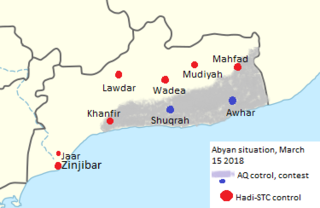
The Abyan conflict was a series of clashes between forces of AQAP loyal to Yemeni president Abdrabbuh Mansur Hadi, and forces loyal to Southern Movement for the control of Abyan between 2016 and 2018.
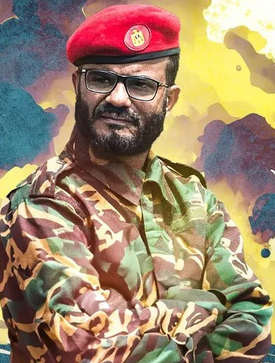
Abdullatif Al-Sayed Bafaqih was a Southern Yemeni warlord from Abyan who played a major role during the wars against Al-Qaeda after 2012 in Abyan Governorate.

The Shabwani Elite are a military unit operating in the Shabwah Governorate of Yemen, mainly against Al-Qaeda in the Arabian Peninsula (AQAP). The unit consisted of at least 6,000 troops and controlled the majority of the province as of early November 2017, according to its commander Mohamed Salem al-Qumishi.
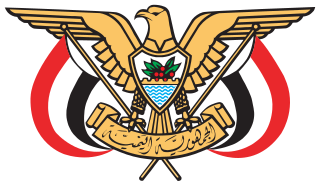
The Ministry of Tourism is a cabinet ministry of Yemen.

In August 2022, forces of Yemen's Emirati-backed separatist Southern Movement, mainly represented by the Southern Transitional Council, launched an offensive in the Abyan and Shabwah provinces. Initially, the Southern forces mostly fought against Saudi-backed government forces, most of which belonged to the armed wing of the Islah party. Since early September 2022, however, the Southern Movement's offensive has become more focused on battling local al-Qaeda strongholds.
Ghalib Ahmed Baquaiti, also known as Abu Hajer al-Hadhrami was a Yemeni jihadist poet and munshid.














